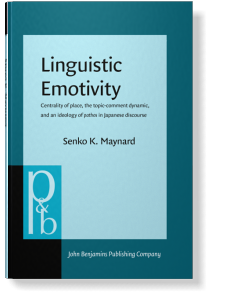Linguistic Emotivity
Centrality of place, the topic-comment dynamic, and an ideology of pathos in Japanese discourse
Author
Netlibrary e-Book – Not for resale
ISBN 9780585462585
Linguistic Emotivity explores expressive and emotive meanings in Japanese from the perspective of the Place of Negotiation theory. The Place of Negotiation theory provides a framework for understanding how linguistic signs function in the place of communication (in cognitive, emotive, and interactional places). The theory finds the indexicality of a sign fundamental and views meanings as being negotiated among interactants who share not only information but, more significantly, feelings.
Using analytical tools recognized in conversation and discourse analyses, the book analyzes emotive topics (vocatives, emotive nominals, quotative topics, etc.) and emotive comments (da and ja-nai, interrogatives, stylistic shifts, etc.) in contemporary Japanese discourse. It argues for the importance of emotivity in Japanese, in the context of the Japanese culture of pathos. Linguistic Emotivity challenges the traditional view of language that privileges logos, form, information, and abstraction, and instead, it proposes a philosophical shift toward pathos, expression, emotion, and linguistic event/action.
Using analytical tools recognized in conversation and discourse analyses, the book analyzes emotive topics (vocatives, emotive nominals, quotative topics, etc.) and emotive comments (da and ja-nai, interrogatives, stylistic shifts, etc.) in contemporary Japanese discourse. It argues for the importance of emotivity in Japanese, in the context of the Japanese culture of pathos. Linguistic Emotivity challenges the traditional view of language that privileges logos, form, information, and abstraction, and instead, it proposes a philosophical shift toward pathos, expression, emotion, and linguistic event/action.
[Pragmatics & Beyond New Series, 97] 2002. xiv, 481 pp.
Publishing status: Available
© John Benjamins Publishing Company
Table of Contents
-
Preface and ackowledgments | p. xi
-
Part 1. Preliminaries
-
1. Introduction: Language, emotivity, and pathos | pp. 3–20
-
2. Background: Emotion, expressive function, and culture | pp. 21–49
-
Part 2. Theory
-
3. The Place of Negotiation theory | pp. 53–72
-
4. The (re-)turn to place | pp. 73–84
-
5. Locating and interpreting emotive meanings | pp. 85–99
-
6. Topic–comment, futaku, and the Rhetoric of Pathos | pp. 101–121
-
Part 3. Emotive topics
-
7. Vocatives and topics | pp. 123–147
-
8. Emotive nominals | pp. 149–163
-
9. Quotative topics | pp. 165–190
-
10. Emotive nan(i) ‘what’ | pp. 191–213
-
Part 4. Emotive comments
-
11. Da and ja-nai as commentary strategies | pp. 217–245
-
12. Interrogatives as emotive comments | pp. 247–275
-
13. Commenting through stylistic shifts | pp. 277–304
-
Part 5. Pathos in Japanese discourse
-
14. Analyzing expressions of pathos in Oda Nobunaga | pp. 307–335
-
15. Rhetoric of Pathos in Mini-Jihyoo newspaper articles | pp. 337–355
-
16. Playing with pathos: Presentation and negotiation of selves in Long Vacation | pp. 357–389
-
Part 6. Reflections
-
17. Linguistic emotivity and the culture of pathos | pp. 393–407
-
18. Language, linguistic theory, and ideology | pp. 409–417
-
Appendix: Information on select data | pp. 419–421
-
Notes | pp. 423–434
-
-
-
Author index | pp. 465–468
-
Subject index | pp. 469–476
“
Linguistic Emotivity makes a valuable contribution to the project of shifting the focus in modern linguistics from a narrow conception of language to one that is more inclusive.”
Joanne Scheibman, Old Dominion University, USA, in Functions of Language Vol. 13:1 (2006)
Cited by (31)
Cited by 31 other publications
Feng, Zongxin
Liu, Feng, Xi Li, Rurong Liu & Jianyu Zeng
Parks, Margaret & Loraine McKay
Chen, Huiling & Jianying Du
2022. The combinative use of “imperative + final particle” in Tokyo language in the Meiji period. Journal of Historical Pragmatics 23:1 ► pp. 146 ff. 
Sandu, Roxana
2022.
Su(m)imasen and gomen nasai
. Pragmatics. Quarterly Publication of the International Pragmatics Association (IPrA) ► pp. 743 ff. 
Tanaka, Lidia
2022. Is formality relevant? Japanese tokenshai,eeandun. Pragmatics. Quarterly Publication of the International Pragmatics Association (IPrA) ► pp. 191 ff. 
Kamperis, Aya
Kamperis, Aya
Sadler, Misumi
Sadler, Misumi
2022. Subjective and intersubjective uses of Japanese verbs of cognition in conversation. Pragmatics. Quarterly Publication of the International Pragmatics Association (IPrA) ► pp. 109 ff. 
Martini, Annaclaudia & Dorina-Maria Buda
Barke, Andrew
White, Cynthia J.
Zawiszová, Halina
Cantrell, Akiyo M
Sugiura, Hideyuki
Tsyrlina-Spady, Tatyana & Michael Lovorn
Prior, Matthew T.
2016. Introduction. In Emotion in Multilingual Interaction [Pragmatics & Beyond New Series, 266], ► pp. 1 ff. 
Koike, Chisato
Brown, H. Paul
Iwasaki, Shoichi
2014. Grammar of the internal expressive sentences in Japanese: Observations and explorations. In Usage-based Approaches to Japanese Grammar [Studies in Language Companion Series, 156], ► pp. 55 ff. 
Moulinou, Iphigenia
Rost, Michael
Shinzato, Rumiko
2014. Subjectivity, intersubjectivity and Japanese grammar: A functional approach. In Usage-based Approaches to Japanese Grammar [Studies in Language Companion Series, 156], ► pp. 85 ff. 
Shinzato, Rumiko
2017. Chapter 11. Grammaticalization of PMs/DMs/MMs in Japanese. In Pragmatic Markers, Discourse Markers and Modal Particles [Studies in Language Companion Series, 186], ► pp. 305 ff. 
Honda, Atsuko
2010. Review of Suzuki (2006): Emotive Communication in Japanese. Journal of Historical Pragmatics 11:2 ► pp. 319 ff. 
IMAI, YASUHIRO
Nishimura, Yukiko
Burry, Jane, Andrew Burrow, Robert Amor & Mark Burry
[no author supplied]
This list is based on CrossRef data as of 18 july 2024. Please note that it may not be complete. Sources presented here have been supplied by the respective publishers. Any errors therein should be reported to them.
Subjects
Philosophy
Main BIC Subject
HP: Philosophy
Main BISAC Subject
PHI000000: PHILOSOPHY / General
